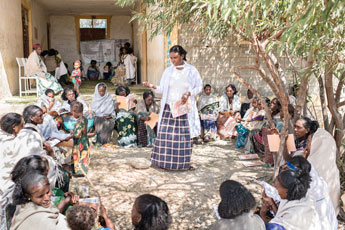L10K Approaches

To help strengthen the Health Extension Program (HEP), L10K works with the Government of Ethiopia to design innovative strategies to engage local communities in improving reproductive, maternal, newborn, and child health (RMNCH) interventions. Since 2007, L10K has implemented community-based interventions in 115 woredas, covering a population of about 25 million people or 30% of Ethiopia's total population, to improve interactions between frontline HEWs, households, and communities.
While still supporting and building on its community-based work, in 2017 L10K broadened its approach to work at all levels of the health system. The project provides technical assistance to national and regional health institutions to ensure health care providers have the support, skills, and tools they need to offer quality RMNCH services. L10K continues to put people at the center of its work and ensure communities play a central role in prioritizing problems and identifying context-appropriate solutions. Through demand generation, capacity building, and technical assistance, L10K contributes to improved RMNCH outcomes in Ethiopia.
Current Strategies (2015-present)
Focus on Regional Health Bureaus and Zonal Health Departments
Using human-centered design, L10K 2020 worked with the Regional Health Bureaus (RHBs) and Zonal Health Departments (ZHDs) to design the project's health systems strengthening activities based on needs and barriers identified by the Federal Ministry of Health (FMOH), RHBs, and ZHDs.
Technical Assistance & Mentoring
To strengthen the capacity of the FMOH, RHBs, and ZHDs to implement Ethiopia's health sector transformation agendas, L10K 2020 provides technical assistance, through long-term technical assistants embedded within the various levels of the health system, as well as short-term technical assistance as needed for specific deliverables. L10K 2020 staff also provide technical support.
Centers of Excellence
To improve the quality of RMNCH services, L10K 2020 is working with RHBs and ZHDs to create Centers of Excellence to serve as models of exemplary RMNCH service sites, as well as innovation labs.
Addressing Inequity in Service Provision
L10K 2020 supports interventions that increase equity in service provision. In addition to identifying skills gaps and strengthening the capacity of health care providers, L10K 2020 uses mentoring and a system-to-system approach to encourage sharing of best practices and lessons learned between low and high performing zones and facilities. L10K 2020 supports low performing zones to plan, implement, and monitor RMNCH services with a focus on context-based solutions and multisectoral engagement for more equitable service delivery.
Grants Support
L10K 2020 provides direct grants to the RHBs and lower performing zones (called “equity zones”) to support the efforts in each region to improve performance of the health system at the woreda level.
Learning Approach
Measurement and evaluation activities are critical for L10K 2020 to influence community health systems and the primary health care strategy in Ethiopia and to provide evidence for supporting global RMNCH policies. L10K 2020 works with the FMOH and RHBs to foster a culture of data collection, analysis, and use for decision making. Publications, tools, and other resources based on L10K 2020's implementation data can be found on the L10K Resources page.
Strengthening Coordination Structures
To improve coordination and implementation, L10K 2020 worked with the RHBs and ZHDs to revitalize the technical working groups (TWGs) that advance the priorities of Ethiopia's Health Sector Transformation Program. TWG meetings are platforms that leverage technical expertise from stakeholders to develop, lobby for, and implement national guidelines and policies.
Previous Strategies (2007-2015)
Community-Based Data for Decision Making (CBDDM) Strategy
Through a simple community map, Community-Based Data for Decision Making (CBDDM) facilitates household level data collection, which Women's Development Army members and Health Extension Workers use to provide appropriate care to women and children.
Participatory Community Quality Improvement (PCQI)
Through discussion forums with community members and service providers, Participatory Community Quality Improvement (PCQI) identifies solutions to improve high impact maternal and newborn services to increase service uptake and improve health outcomes.
Early Care Seeking and Referral Solutions
Early Care Seeking and Referral Solutions is an intervention that engages community members and health care providers to develop solutions to increase effective referrals, which help improve care seeking behaviors.
Basic Emergency Obstetric and Newborn Care (BEmONC)
Basic Emergency Obstetric and Newborn Care (BEmONC) equips health care facilities to handle complications during childbirth, significantly reducing maternal and newborn mortality rates.
Integrated Community Case Management of Common Childhood Illness (iCCM)
Integrated Community Case Management (iCCM) builds the skills of health care providers to correctly assess, classify, and manage common childhood illnesses with the aim of reducing the mortality of children under five.
Community-Based Newborn Care (CBNC)
Community-Based Newborn Care (CBNC) is a national newborn care package used by front line health workers to provide services along the continuum of care (pregnancy to post pregnancy) and reduce newborn mortality.
Expanded Program on Immunization (EPI)
The World Health Organization established the Expanded Program on Immunization (EPI) to prevent diseases by making vaccines available to all children. L10K integrated EPI into the project's existing community-based strategies.
